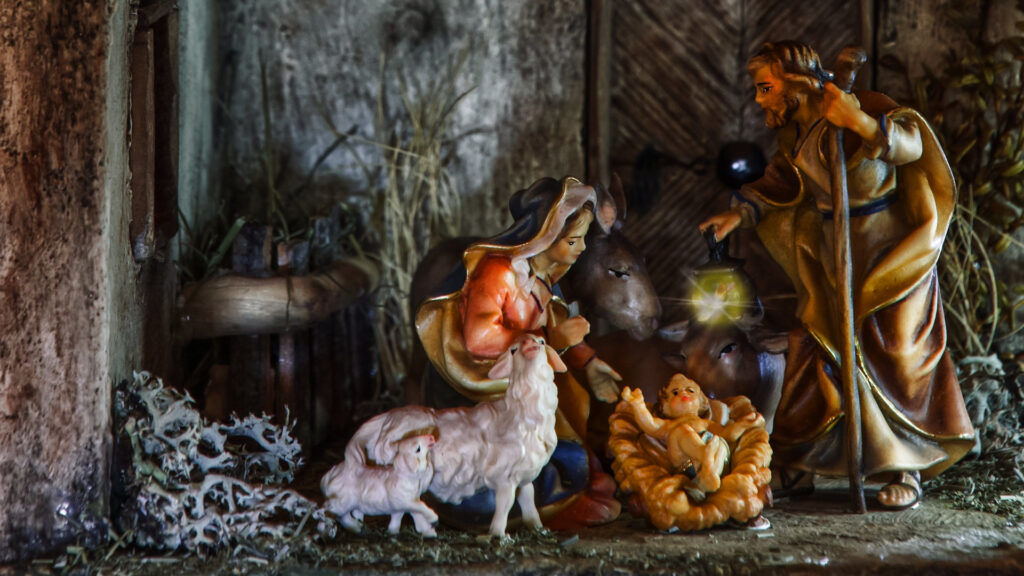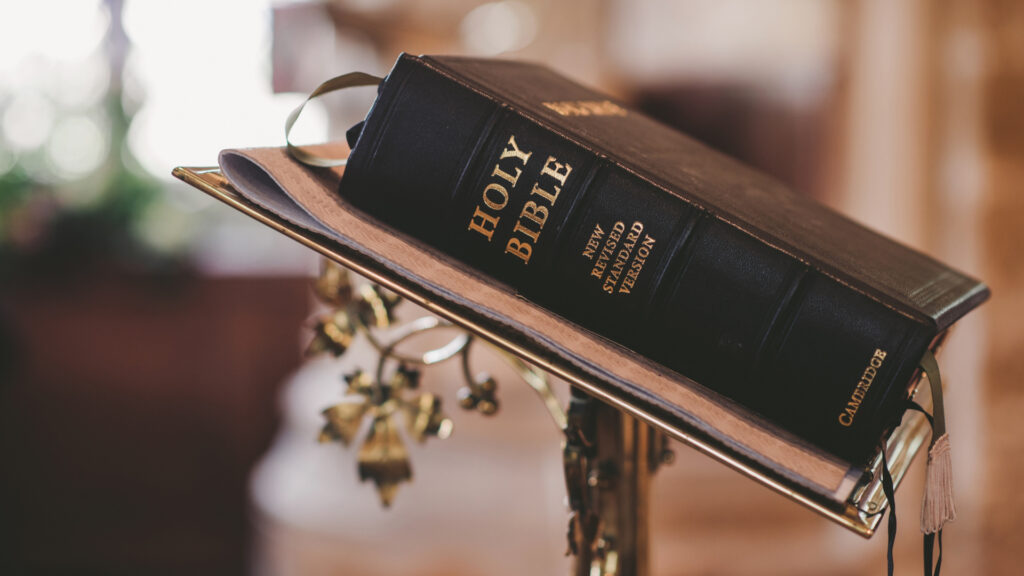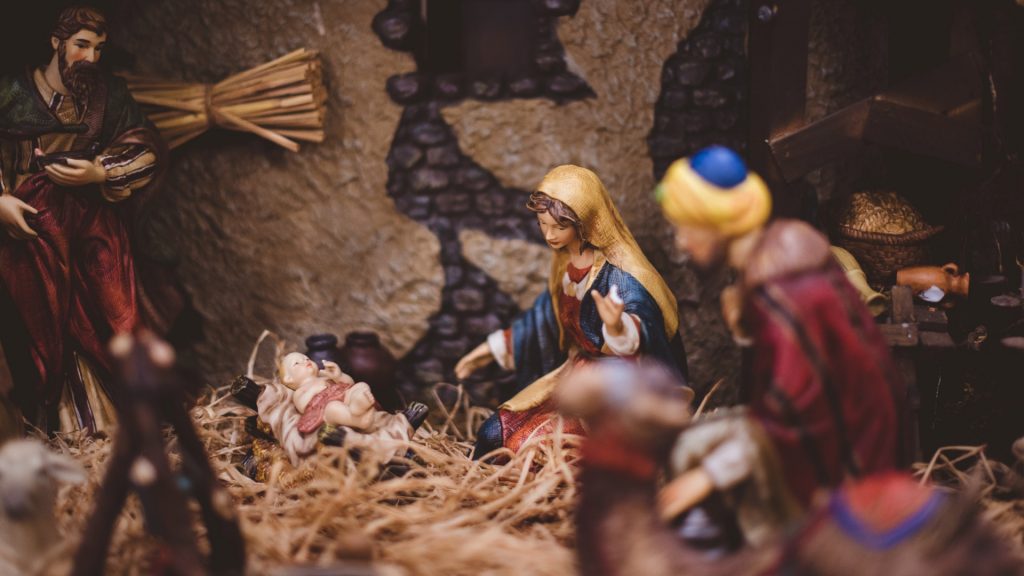Seasonal
Christmas Humility
Read This Week: Luke 2
So Joseph also went up from the town of Nazareth in Galilee to Judea, to Bethlehem the town of David, because he belonged to the house and line of David. He went there to register with Mary, who was pledged to be married to him and was expecting a child. While they were there, the time came for the baby to be born, and she gave birth to her firstborn, a son. She wrapped him in cloths and placed him in a manger, because there was no guest room available for them. – Luke 2:4-7 NIV
The Gospel of Luke, Chapter 2, narrates the birth of Jesus, the announcement to the shepherds, and the presentation of Jesus at the temple. While this chapter is often read during the Christmas season, its themes transcend the holidays, offering profound lessons on humility, divine purpose, and our response to God’s work.
Luke 2:1-7 describes how Mary and Joseph travel to Bethlehem for a Roman census, where Jesus is born in a humble setting—a manger because there was no room at the inn. This image of the Messiah entering the world is striking, not in royal splendor but in modest obscurity. It’s a reminder that God often works in unexpected ways and through ordinary circumstances. In our fast-paced, achievement-driven culture, the humility of Jesus’ birth challenges us to reconsider what we value. Are we chasing recognition and material success, or are we finding contentment in serving others, even in quiet, unnoticed ways?
The following section (vv. 8-20) shifts the focus to a group of shepherds watching their flocks by night. Shepherds, often marginalized in society, are the first to hear the good news of Jesus’ birth. An angel appears, declaring: Do not be afraid. I bring you good news that will cause great joy for all the people (v. 10). This moment is rich in meaning. The shepherds represent the “lowly” to whom God’s grace is extended. The angel’s message is inclusive and joyful, emphasizing that Christ’s coming is for all people, regardless of status or background. This passage prompts a question: How can we ensure that our lives reflect this inclusivity? Do we share the gospel message of hope and joy with those who may feel overlooked or excluded?
One of the most touching verses in the chapter is found in verse 19: But Mary treasured up all these things and pondered them in her heart. Amid the miraculous and the chaotic, Mary’s response is reflective and meditative. In a world filled with constant noise and distraction, Mary’s example encourages us to pause, reflect, and treasure the moments we sense God’s presence. It inspires us to create space for spiritual reflection in our daily lives intentionally.
The latter part of the chapter (vv. 25-38) introduces Simeon and Anna, two devout individuals who recognize the infant Jesus as the promised Messiah. Simeon’s proclamation (my eyes have seen your salvation) and Anna’s joyful testimony demonstrate the fulfillment of long-held hopes and the power of patient faith. Their stories remind us that faith often requires waiting and trust. In our modern era, where instant gratification is the norm, Simeon and Anna’s steadfastness is a powerful example of trusting God’s timing.
The story of Jesus’ birth calls us to embrace humility and seek ways to serve others selflessly, emulating the meekness of Christ’s entrance into the world. It moves us to share the Good News like the shepherds and express joy and hope with those around us, especially those who may feel marginalized. It alerts us to cultivate reflection and time to ponder and treasure the ways God works in our lives. It encourages us to practice patience and trust in God’s timing, even when the wait feels long, as Simeon and Anna did.
Luke 2 is more than a Christmas story; it’s a call to live with humility, joy, and faith. By reflecting on its themes, we can find fresh inspiration to align our lives with God’s purposes, no matter the season.
Timeless
Read This Week: Luke 2
So Joseph also went up from Nazareth in Galilee to Judea, to Bethlehem, the town of David, because he belonged to the house and line of David. He went there to register with Mary, who was pledged to be married to him and was expecting a child. While they were there, the time came for the baby to be born, and she gave birth to her firstborn, a son. She wrapped him in clothes and placed him in a manger because no guest room was available for them. Luke 2:4-7 NIV
It’s that time of year again when the world pauses and engages in Christmas festivities, traditions, and celebrations. People worldwide will play music, attend parties, buy and wrap packages, exchange gifts, and even participate in religious gatherings. But this time of the year is also a moment when the name of Jesus Christ is impressed upon the world’s consciousness: his story, his divinity, and his ever-present importance to all humankind. This season points again to the timeless and transcendent message of Christ and his birth that holds a significance that cannot be lessened by time or the retelling of it.
In the annals of the New Testament, Luke 2 stands out in this radiant and timeless narrative that weaves together the essence of hope, redemption, and the miraculous. It is a pivotal chapter in the Gospels that unveils this profound story and offers us and everyone who hears it a glimpse into the divine orchestration of a world-changing event. It opens with the decree of Caesar Augustus, the Roman emperor, ordering a census that required everyone to return to their ancestral towns. Against this historical backdrop, we find Joseph and a pregnant Mary embarking on a journey to Bethlehem, Joseph’s city. The humble setting of a stable in this forgotten town would become the stage for one of the most transformative moments in history.
As Mary and Joseph arrive in Bethlehem, we witness the simplicity and humility surrounding the birth of Jesus. The Son of God, the long-awaited Messiah, is born not in a palace or amidst grandeur but in a lowly manger. This choice of where the baby is born is a powerful testament to God’s preference for the meek and the humble, emphasizing the message of salvation being available to everyone. In Luke 2:8-20, we see the angelic proclamation to a group of shepherds in the fields. The announcement of the birth of Jesus is accompanied by a heavenly host praising God, and the shepherds are compelled to seek out the newborn Savior. Those on the margins of society see this divine revelation, underscoring the same inclusive nature of the gospel message.
This chapter also recounts the presentation of the baby Jesus at the temple in Jerusalem. Here, Simeon, a devout and righteous man, recognizes the child as fulfilling God’s promise to bring salvation to Israel and the Gentiles. It emphasizes the comprehensive scope of God’s redemptive plan, extending beyond ethnic and cultural boundaries. It is timeless and for all who will call on the name of the Lord.
In an ever-changing world and social landscape, the Christmas story rises above as an everlasting beacon of hope that illuminates the transformative power of Christ. It invites us to contemplate the profound mystery of the Incarnation, where the divine intersects with the ordinary, and to not see it as merely a historical event but an eternal proclamation of God’s love, grace, and redemption for all of humanity. It never gets old, becomes just a rehearsed story once a year, and always retains its power to captivate and save. It is timeless.
All Things New
Read This Week: Luke 24
On the first day of the week, very early in the morning, the women took the spices they had prepared and went to the tomb. They found the stone rolled away from the tomb, but when they entered, they did not find the body of the Lord Jesus. While they were wondering about this, suddenly, two men in clothes that gleamed like lightning stood beside them. In their fright, the women bowed down with their faces to the ground, but the men said to them, “Why do you look for the living among the dead? He is not here; he has risen! Remember how he told you, while he was still with you in Galilee: ‘The Son of Man must be delivered over to the hands of sinners, be crucified, and on the third day be raised again.'” Then they remembered. – Luke 24:1-8 NIV
A new day brings new things. It brings new opportunities, challenges, mercy, chances to make things right, and a new run at the life God has given us. Something is refreshing and exciting about all things being new. It brightens the view and lifts the spirit when we’re reminded that life offers and promises new things. On Resurrection Sunday in Luke 24, something new was about to be discovered that would change not only the women going to the tomb but the fate of humanity from that moment forward.
Jesus had been raised from the dead just like he said he would. Death had given way to the triumph of God’s sovereign plan of redemption and the fulfillment of His new covenant through Christ. Verse 3 says they found the stone rolled away from the tomb, but when they entered, they did not find the body of the Lord Jesus. The Lord had removed the huge stone in front of the grave, and Jesus had walked out in the newness of life. And because of the Resurrection, we have a new life. We live for Christ and leave behind the second death, the control of sin, self-interest, and destructive patterns of our old lifestyle. 2 Corinthians 5:15-17 says:
He died for everyone, so those who receive his new life will no longer live for themselves. Instead, they will live for Christ, who died and was raised for them. This means that anyone who belongs to Christ has become a new person. The old life is gone; a new life has begun!
When a new life begins, we have a new outlook. Luke 24 tells us that the women were afraid and put their faces to the ground in alarm and fright. But the two angels spoke and reminded them of Jesus’ promise that he must be delivered to the hands of sinners, be crucified, and be raised on the third day. Then they remembered his words, and their outlook changed. They were delighted and couldn’t wait to share the truth with others. Their sorrow had turned to joy, their anxiety turned to anticipation, and their fear turned to confidence and trust. That is the new outlook that the Resurrection gives us.
Finally, the Resurrection gives us new hope. When our future hope is real to us, it changes how we live in the present. The new hope of the first day of the week, when Jesus walked out of the grave in victory, empowers and inspires us to live for Him daily. Our new hope can make the mountaintops sweeter, the valleys less daunting, and the mundane more meaningful. It can change the decisions we make, the places we go, the people we serve, and the purpose we live for.
Joni Eareckson Tada, Christian author and speaker who suffered a devastating injury to her vertebrae at 17 years old and became a quadriplegic said this about her new life in Christ: “I, with shriveled, bent fingers, atrophied muscles, gnarled knees, and no feeling from the shoulders down, will one day have a new body, light, bright and clothed in righteousness – powerful and dazzling. Can you imagine the hope that the Resurrection gives someone spinal-cord injured like me?” The Resurrection of Jesus makes all things new.
The Whole Story
Read This Week: Luke 2
So Joseph also went up from the town of Nazareth in Galilee to Judea, to Bethlehem the town of David, because he belonged to the house and line of David. He went there to register with Mary, who was pledged to be married to him and was expecting a child. While they were there, the time came for the baby to be born, and she gave birth to her firstborn, a son. She wrapped him in cloths and placed him in a manger because there was no guest room available for them. – Luke 2:4-7 NIV
Christmas often gets the greatest attention. It is the most palpable time of the year for the believer in Jesus and those who claim no religious affiliation. Easter is widely celebrated, to be sure, but it is not on the level of the Advent season in terms of acceptance and observance. People worldwide will sing spiritual songs, be more generous than at any other time, and even attend a church gathering where the message of salvation is shared and the Scriptures are read. One such Scripture is Luke chapter 2. This passage can be quoted by the secular and sacred alike. For some, it will be the only biblical passage they will ever hear.
This is an interesting fact about Christmas and these Bible verses because Luke writes the longest Gospel and most extended narrative in the New Testament. Yet, he describes Jesus’ birth in straightforward, short terms. In chapter 2, twenty verses cover the incarnation and its surrounding events. However, starting in chapter 22 with the betrayal by Judas, the author dedicates three chapters and one hundred seventy-nine verses to the death, burial, and resurrection of Christ. Perhaps this tells us something about the overall narrative of God.
It could be that we are careful not to treat the birth of Christ as if it were the beginning. If we see Jesus’ birth as just the start of the Savior, then we will miss the significance of what the Lord ordained in eternity past and what He did after Bethlehem. Jesus’ birth is not merely the opening of the story. It’s a supernatural occurrence within it, a pivotal moment in the complete story of God. It was the time in the metanarrative when Immanuel was with us; therefore, the virgin birth cannot be contained to a moment in history. It is a moment for eternity.
Seeing Christmas in light of the whole story of God makes it more joyous, promising, and hopeful. It isn’t just joy for a short time; it is joy complete in Christ for all time. It isn’t just peace on earth for a sliver of a moment but eternal peace in heaven. It isn’t just a promise for one day; it is a promise for every day. It isn’t just hoping for a season; it is hope forever. So let’s give Christmas the attention it deserves as an impactful moment in the grand narrative of God’s glory and redemption.
Easy Thank You
Read This Week: Psalm 95
Come, let us sing for joy to the Lord; let us shout aloud to the Rock of our salvation. Let us come before him with thanksgiving and extol him with music and song. For the Lord is the great God, the great King above all gods. – Psalm 95:1-3 NIV
There is the adage that saying please and thank you are two of the hardest things for people to do. This struggle needs to be clarified because saying thank you seems like one of the easiest ways anyone can express gratitude. It requires minimal effort to open our mouths and use our voices to utter two words of gratefulness for the things given to us in our lives and the things that happen to us due to someone else’s effort.
It is hard to say thank you only because we make it so. It is difficult because we can lack the humility and gratitude it takes to thank someone for something they have done for us. When it comes to our Father God, it is an easy thank you. When we consider who He is and all He has done for us, expressing gratitude and thanks takes on various forms, from talking to singing to worship with our mind, body, and spirit.
A gratitude challenge would be to take time with the list below and reflect on the Lord and His provision. This exercise is good for activating thankfulness in our hearts during this season of Thanksgiving and beyond.
God abounds in goodness.
He does not change.
He is compassionate.
He is a God of peace.
He is a righteous judge.
He is all-powerful.
He is eternal.
He is everywhere.
He is forgiving.
He is gracious.
He is impartial.
He is justice.
He is patient.
He is merciful.
He is mighty.
He is love.
He is our helper.
He is our salvation.
He is our righteousness.
He is our shepherd.
He is wise.
He gives perfect gifts.
He protects.
He is our guide.
His yoke is easy, and His burden is light.
His grace is sufficient.
His presence is imminent.
He is our sustainer.
He is our defender.
He is the truth.
He is unequaled.
He is without limits.
He is perfect.
He receives all glory.
He rewards those who seek Him.
He works in our lives.
He uses us for His purposes.
He gives us a mission.
He is coming again.
When we take a step back to think and observe all the characteristics of God and what He provides for our lives now and throughout eternity, saying thank you is the easiest thing in the world.
Not a Silent Night
Read This Week: Luke 2
And shepherds were living out in the fields nearby, keeping watch over their flocks at night. An angel of the Lord appeared to them, and the glory of the Lord shone around them, and they were terrified. But the angel said to them, “Do not be afraid. I bring you good news that will cause great joy for all the people. Suddenly a great company of the heavenly host appeared with the angel, praising God and saying, “Glory to God in the highest heaven, and on earth peace to those on whom his favor rests.” – Luke 2:8-20 NIV
Silent Night is a beautiful and melodic Christmas song performed and sung every year in multiple iterations and settings. It was a musical collaboration of a priest and a school teacher, and the most recognizable and famous lines in the song are Silent night, holy night. All is calm; all is bright. Round yon virgin, mother and child. Holy infant, so tender and mild. Sleep in heavenly peace.
These words are so prosaic and lovely and paint a quiet, peaceful picture of the night Jesus was born. And while the theme of the song is accurate in its musings that the quietness of peace did reign that night, Luke 2 tells us that it was not a silent night after all. It had not been a quiet or silent lead-up to that night either.
The murmurings of scandal about Mary and Joseph’s relationship and situation were not silent. The voices of doubt and skepticism were no doubt heard. The pronouncement of the coming Messiah to Mary was not quiet, and neither was the angel’s hope and assurance that followed. Joseph’s obedience was loud and clear, and Mary’s song of joy and eternal fulfillment was anything but silent as she proclaimed the Magnificat.
Ceasar’s decree was not silent in its mandate and necessity for the prophecy to be fulfilled. Herod was not quiet in his violent warnings and desire to eliminate the perceived threat to his earthly authority and rule.
Even the open countryside was abuzz with activity and noise. Verses 9 and 13-14 show us the grand appearance of the angel of the Lord to the shepherds and the worship service that took place afterward:
An angel of the Lord appeared to them, and the glory of the Lord shone around them, and they were terrified… Suddenly a great company of the heavenly host appeared with the angel, praising God and saying, “Glory to God in the highest heaven, and on earth peace to those on whom his favor rests.”
But there were some silent things that night. The baby Jesus’ cry in the dark rendered oppression silent. It forced hopelessness silent. It commanded evil to be silent. It spoke to lasting pain and called for it to be silent. It made spiritual lostness silent and quieted all the voices of doubt that the Messiah would never come.
See, good news makes it hard to keep quiet. The same should be true of us today. We must live out loud and proclaim the coming of Jesus Christ in a non-silent way. The message of Christmas should be on full display in our lives, even though the forces of this world seek to be a silencing mechanism to our witness. It is not a silent night when we celebrate and worship the God of the universe and the birth of the Savior all year long.
Incredible
Read This Week: Luke 2
So Joseph also went up from the town of Nazareth in Galilee to Judea, to Bethlehem the town of David, because he belonged to the house and line of David. He went there to register with Mary, who was pledged to be married to him and was expecting a child. While they were there, the time came for the baby to be born, and she gave birth to her firstborn, a son. She wrapped him in cloths and placed him in a manger because there was no guest room available for them.” – Luke 2:4-7 NIV
In-cred-i-ble (in-ˈkre-də-bəl) function: adjective 1 : too extraordinary and improbable to be believed 2 : an amazing or fantastic claim
Language is so powerful and important. It shapes the way we see the world, ourselves, and other people. What we say possesses amazing abilities. It can be humble yet boastful. It can attract or repel. It can build up and tear down. Words bring peace, preserve history, communicate truth, reunite friends, and harmonize families. They’ve even been known to sink a few ships, save a few lives, and close a few deals. It is a compelling thing about us as human beings in how we choose and use words.
Particularly fascinating is our use of the word incredible. It seems to find its way into an everyday conversation and into any speech or remark that necessitates an adjective. But it begs the question: are all of these things actually incredible? Hyperbole is one thing but are they too extraordinary to be believed? Are these things we talk about so improbable that people would not trust their legitimacy? Was lunch so exceptional that it defied description? Maybe, but let’s consider something that is all of those things and more.
A young engaged woman, who would not consummate her relationship with her husband until after her child is born, is visited by an angel and told she will be impregnated by supernatural means and conceive a son who is to be named Jesus. Jesus will not be an ordinary child. Instead, he will be the transcendent Son of God, perform many miracles, attract a myriad of followers and enemies, die a cruel death on a cross, rise from the dead after three days and reign over a kingdom that has no end.
All of this would occur just as the Scriptures foretold many years before. God had promised that the Messiah would be human, and not an angelic being (Genesis 3:15). He would be of Jewish origin (Genesis 12:1-3; Numbers 24:17). He would be from the tribe of Judah (Genesis 49:10), and the family of David (2 Samuel 7:1-17). The Savior would be born of a virgin (Isaiah 7:14) in Bethlehem, the city of David (Micah 5:2). He would be the Lamb of God sacrificed for the sins of the world (John 1:29). And Luke 2 shows us that it all happened.
When Mary said in Luke 1:38, “I am the Lord’s servant, may your word to me be fulfilled,” she knew her life experience would be part of the fulfillment of divine prophecy dating thousands of years. She knew her journey would be too extraordinary to believe at times. She knew that it would be so incredible that people would not trust its legitimacy. She knew but believed.
And because of the most significant moment of all time, it is always and shall ever be an amazing and fantastic claim for us to know and love Jesus. To have a relationship with the one true God who created us and sent His Son into this world to bring Himself eternal glory and redeem mankind. Knowing all of this, incredible is the appropriate word for the real story of Christmas.
Not Here
Read This Week: Luke 24
They found the stone rolled away from the tomb, but when they entered, they did not find the body of the Lord Jesus. While they were wondering about this, suddenly two men in clothes that gleamed like lightning stood beside them. In their fright, the women bowed down with their faces to the ground, but the men said to them, “Why do you look for the living among the dead? He is not here; he has risen! – Luke 24:2-6 NIV
One of the great thinkers and writers of the 20th Century, C.S. Lewis, once said this about the identity of Jesus, “A man who was merely a man and said the sort of things Jesus said would not be a great moral teacher. He would either be a lunatic — on a level with the man who says he is a poached egg — or else He would be the Devil. You must make your choice. Either this man was, and is, the Son of God: or else a madman or something worse. You can shut Him up for a fool, or you can fall at His feet and call Him Lord and God.”
Lewis’ point about Jesus being the Savior of the world and not merely a good teacher is confirmed in the four words spoken by the angel to the women at the tomb: He is not here. This message was not of this world. It was transcendent, divine, and proven by the empty grave. The resurrection confirmed that Jesus had fulfilled his predictions that he would rise from the dead. It settled, once and for all, that he was indeed the Lord and God, and not just an enlightened sage. That was and is really good news.
It is good news because as Paul wrote in Romans 6, the resurrection allows us to not be here either. It empowers us to be new people in Christ. He wrote, “We were therefore buried with him through baptism into death so that, just as Christ was raised from the dead through the glory of the Father, we too may live a new life.” When we encounter and are changed by the risen savior, the old habits, thinking, and tendencies can’t be found anymore. The old ways and people are not here. We are new people with a new life.
When others encounter us, they are surprised and impacted because they don’t see the old. That person is gone. Changed forever by the One who conquered death and made all things new. The One who was alive when people went searching for a dead man.
So the next time the Enemy tries to accuse us with our past, we can say in the name of Jesus: “Not here!” The next time someone tries to shame us with our old actions and behaviors, we can proclaim in Christ: “Not here!” Because of the resurrection, we can wake up every day with faith and a confident hope to say to our former selves: “Not here!”
Hope
Read This Week: Luke 1 and 2
May you experience the hope that is found in the Gospel of Jesus Christ this Christmas season.
Hope is the benefit and not the doubt.
It is silver in the lining.
It knows the sunshine is somewhere behind the rain.
Hope moves the arm that goes down swinging.
It propels one foot in front of the other.
It compels the fingers to cross.
It is the effort in the last-ditch.
Hope is the wing that carries the prayer.
It is the gun that shoots for the moon.
It is the radiance of the light at the end of the tunnel.
It is the exclamation point behind joy!
Hope put a melody in Mary’s heart after she received news that would’ve startled the bravest of souls. Hope was the assurance of her purity amid the stinging voices of skeptics. It was her anesthetic during labor on the dirt in her fiancée’s hometown.
Hope serenaded her while listening to the rumblings of outside activity. It soothed her as the aroma of farm animals filled her nostrils. It fueled her happiness as she welcomed strangers and shepherds.
Hope caused her to trust when her family was on the run. It comforted her in hiding. It gave her energy as she watched her firstborn grow up. Hope sprung eternal as she saw him die. It was her confirmation when she found out he was alive. It whispered in her most desperate moment that she would see him again.
George Iles once said, “Hope is faith holding its hand out in the dark.” That is good but the writer of Hebrews put it better when he said, “Faith is the substance of things hoped for, the evidence of things not seen.”
Hope is not just faith holding its hand out in the dark. It is the faith that someone is going to turn the light on and something extraordinary is going to be in your hand. That is what God gave us in Jesus. Therefore, we hope. We have hope.
First Things First
Read This Week: Psalm 136
Give thanks to the Lord, for he is good. – Psalm 136:1
Ingratitude. There are few emotions in human beings sadder than this. An ungrateful spirit can be poisonous and toxic to relationships, environments, marriages, families, and communities. It shades and colors everything with entitlement and selfishness.
It is scary that we have this in us; that ingratitude lives in our flesh and makes us capable of hurting ourselves and others with a spirit of thanklessness and prerogative. It seems like the more that is done for an ungrateful heart, the worse it becomes. Alternate energy is gained from kindness, graciousness, and benevolence. If given more, it’s not enough. If given less, it’s unfair.
This is not a new revelation, however, after 400 plus years of slavery in Egypt, the Israelites were released from bondage by God’s hand. As they exited, they were blessed with cattle, food, gold, supplies, and riches. God then performed many miracles as they journeyed through the treacherous wilderness. He made a covenant with them, selected them as His people and said He would take them to the promised land. Pretty amazing, right? Not for the Israelites.
They were so ungrateful that, at one point, they expressed their desire to go back to Egypt. They failed to appreciate the blessings, provision and powerful miracles that God did for them and it caused them to long for a place where they had experienced hundreds of years of oppression and atrocity. Their ingratitude made them completely unreasonable and took their focus off of the beauty and kindness of the One blessing them and onto what they thought He should be giving them. They sought the blessing and not the Blesser.
King David knew about the history of his people and the ingratitude of man when he wrote this in Psalm 136:1, “Give thanks to the Lord, for he is good, for his steadfast love endures forever.” The starting point of his gratitude is not the tangible things God provides or gives but it is simply God Himself. The person and character of God is the catalyst for David’s praise and thanksgiving. It is what he recognizes first before he calls attention to the things God has done. He keeps first things first and doesn’t get distracted by the gifts because he’s too busy expressing his thankfulness for the Giver.
Perhaps this Thanksgiving and always, we will be reminded of our tendency to be like the Israelites if the Holy Spirit doesn’t guide our thoughts, control our minds and check our motives. If we keep first things first and don’t get too obsessed with what we’re getting or not getting to be thankful for what we already have in the person of Jesus!
A relationship with the God of the universe through Christ and the experience of His love is all that we need in life. It is more than enough for us to be grateful now and forever. So, let’s live with thankful hearts, act in a peaceful, rational manner and positively affect others with a spirit of gratitude.









